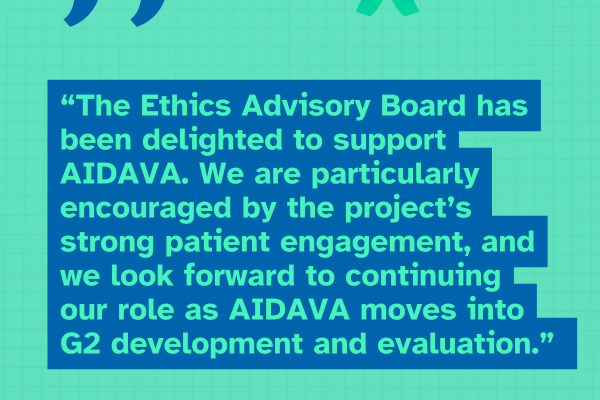AIDAVA’s Independent Ethics Advisory Board of Experts
AIDAVA is fortunate to have an independent Ethics Advisory Board of Experts (EAB). Projects like AIDAVA include several advisory structures, and an EAB is always needed to ensure that ethics and data protection matters are given the highest attention.
The EAB complements the legal and ethical work already carried out by each partner and their institutional research ethics committees. In close collaboration with Work Package 4, the EAB offers project-wide guidance to support ethical decision-making, safeguard data protection, and ensure that patients’ interests remain central.
Contributions of the EAB
The AIDAVA EAB has provided valuable input based on their expertise in health information technology, research ethics, and data governance. Their advice has included:
- Guidance on how to present AIDAVA’s work to local Research Ethics Committees.
- Data access and management strategies to protect patients’ privacy interests.
- Reflections on legal and ethical issues, focusing on how they affect participants and their care teams.
- Recommendations on identifying and responding to patients’ overall interests, complementing the work of the Patient Advisory Group.
- Suggestions on meeting data protection requirements (including GDPR) and other governance needs.
- Ensuring that patient-facing communications are clear and realistic about project benefits.
- Capturing wider learnings from data handling processes to inform future research.
- Insights into scale-up and accessibility for the wider patient community.
EAB Activities
The EAB has taken an active role in AIDAVA, engaging directly in project activities:
- Participating in pilot workshops alongside patient consultants to enhance studies and better understand patient experiences.
- Attending consortium meetings to provide updates, share guidance, and comment on research protocols with the participant perspective as the top priority.
- Offering ethical and practical views on the use of minimal identifying data, including synthetic data for testing purposes.
- Strengthening collaboration with the Patient Advisory Group, inviting its chair to EAB meetings and vice versa, to ensure patient experience is fully represented.
The EAB is chaired by Don Willison (University of Toronto) and includes Julie Power (Vasculitis Ireland Awareness), Brendan Barnes (former Privacy Officer at EFPIA), and Peter Singleton (Cambridge Health Informatics).
The EAB has been delighted to support AIDAVA’s progress to date and looks forward to continuing its role during the development and evaluation of Generation 2 (G2). The board remains particularly engaged in the project’s patient engagement activities and is committed to ensuring the highest ethical and data protection standards throughout.
